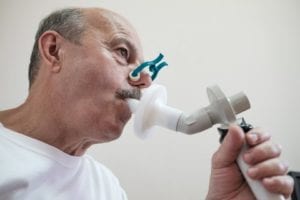Study Evaluates Breath Test to Detect Early Mesothelioma

Doctors in Michigan have launched a study to determine if volatile organic compounds (VOCs) in exhaled breath can detect early mesothelioma. They are also looking for a correlation between participants’ VOCs and biomarkers in the blood.
VOCs can give doctors vital information about cellular metabolism. Previous studies of VOCs show that they can sometimes indicate the presence of mesothelioma.
But no one knows yet if VOCs can really detect early mesothelioma. None of the previous studies have been big enough for the technique to be universally recommended.
How VOCs Can Detect Early Mesothelioma
Cancer causes biochemical changes in the body. These biochemical changes produce VOCs that a person exhales. Different types of cancer produce different combinations of VOCs. Breath testing measures these VOCs to see what type of cancer produced them.
One of the big advantages of breath testing to detect early mesothelioma is that it is painless and non-invasive. This makes it easy, fast, and relatively inexpensive.
Mesothelioma is rare but highly aggressive. By the time symptoms of mesothelioma appear, it may already be too late for effective treatment. Even after symptoms appear, mesothelioma is not easy to diagnose. Mesothelioma diagnosis usually requires imaging studies and biopsies.
If breath and blood testing can detect early mesothelioma, doctors could start treatment earlier when it may be more helpful.
New Study Larger Than Other VOC Studies
Ascension Southeast Michigan developed the new VOC study. It will include 300 people. This makes it one of the largest tests of VOCs to detect early mesothelioma.
Participants either have mesothelioma or pleural plaques from asbestos exposure. Most of the asbestos-exposed people will be members of the International Association of Heat and Frost Insulators or the Allied Workers Union. The unions are helping to pay for the study.
Study subjects will exhale into a machine. They will also have a blood test. Researchers will compare biomarkers from people with mesothelioma to people with pleural plaques. The goal is to see how accurate the test is to detect early mesothelioma or rule it out.
“A comparison of the participant’s VOC profile will be made with an FDA-approved, serum-based assay of the participant’s soluble mesothelin related peptides (SMRP) to discern parameters of efficacy,” says the trial description.
If there are clear differences, it means the tests could be valuable to detect early mesothelioma. The team will develop a mesothelioma breath and blood biomarker “signature” based on the results. They will evaluate the accuracy of the “signature” test in the second part of the study.
The first part of the study will end in March 2021. Evaluation of the test will finish in March 2022.
Sources:
“Mesothelioma Early Detection by VOCs (MED-VOC)”, research study, June 5, 2019 – March 2022, https://clinicaltrials.gov/ct2/show/NCT04106973?term=%22malignant+mesothelioma%22#contacts





